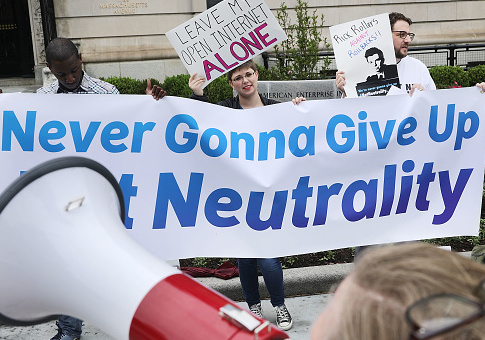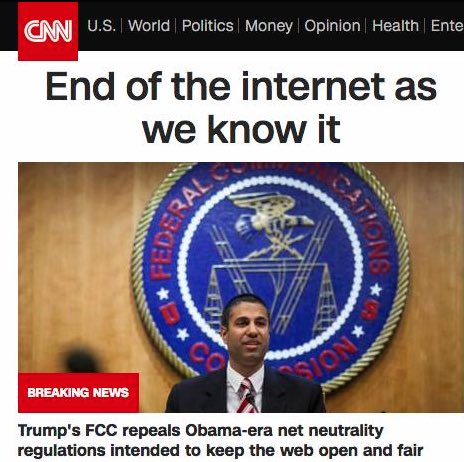When the Federal Communications Commission announced in 2017 that it was ending "net neutrality," a series of rules which governed how users could access the internet, the media and Democrats rushed to pronounce the internet dead. CNN even ran an obituary on its homepage:
Of course, the internet didn't die. But that doesn't matter to the Democrat-led FCC, which this week announced it was attempting to resurrect net neutrality. "The agency argues that restoring the rule will improve consumers’ experience with internet providers—including by enabling it to better track broadband service outages and network reliability," the Washington Post reported.
If and when net neutrality returns, most Americans likely won't notice the difference—just like they didn't notice the first time. But in honor of the FCC's efforts to bring back the dead, let's look back at the Democrats' and the media's lamentations for net neutrality.
NBC News: "Internet a 'Lifeline For LGBTQ People': Advocates Slam Net Neutrality Repeal":
Some LGBTQ advocacy groups are joining tech companies and consumer advocates in criticizing the FCC's repeal of Obama-era net neutrality rules. ...
Jessie Daniels, a sociology professor at Hunter College in New York City, said the FCC’s move will disproportionately affect marginalized communities.
The Verge: "Net Neutrality is Dead. It’s Time to Fear Mickey Mouse":
It’s a red letter day for the media industry. Disney just took control of 21st Century Fox’s media empire, and the Federal Communications Commission voted to repeal net neutrality regulations that prevent internet providers from discriminatory behavior. These two industry-shaking events will set media companies on a dramatic collision course with ISPs. It is the conflict that threatens the internet.
Washington Post: "The FCC’s Net Neutrality Rules are Gone. Now This is What Could Happen to The Web.":
Let’s talk about the end of net neutrality in terms of a hellscape everyone knows: airport security lines. ...
It’s really about what happens to the smallest players in our economy. So picture another place where the little guy gets hosed: a busy airport. Imagine Verizon and Comcast are running the security lines—and websites and services are the ones trying to get through.
With net neutrality, all those sites pass through at the same speed.
But of course, airport security these days is all about a pecking order. ...
Without the neutrality rules, Internet providers could set up their own fast lanes—meaning certain websites could buy first-class treatment, while others are stuck in cattle class. Providers could sell Internet service in packages, like cable-TV bundles. Service providers would also have the right to set up their own no-fly lists, blocking certain websites that they don’t like or compete with their own business.
NPR: "FCC Repeals 'Net Neutrality' Rules For Internet Providers":
The FCC's dramatic course reversal in favor of Internet service providers has propelled the once-wonky issue of net neutrality into the mainstream, turning it into an increasingly political matter. Advocacy groups are expected to press Congress to stop the FCC's vote from taking effect under the Congressional Review Act.
GQ: "How the FCC’s Killing of Net Neutrality Will Ruin The Internet Forever":
In fact, pretty much everything you hate about the Internet (minus, like, Twitter trolls) is because of the companies you have to deal with to get the Internet: Time Warner/Spectrum, Comcast, Verizon, AT&T. As I type this, the FCC is planning on killing net neutrality in favor of allowing those companies you hate to control just about every aspect of your online experience.
New York Times: "The Internet Is Dying. Repealing Net Neutrality Hastens That Death.":
Nope, that freewheeling internet has been dying a slow death—and a vote next month by the Federal Communications Commission to undo net neutrality would be the final pillow in its face.
The Nation: "If Trump’s FCC Repeals Net Neutrality, Elites Will Rule the Internet—And the Future":
Net-neutrality protections assure that the essential democratic discourse on the World Wide Web cannot be bartered off to the highest bidders of a billionaire class that dominates the political debate on so many other media platforms.
Washington Post: "FCC Net Neutrality Process ‘Corrupted’ by Fake Comments And Vanishing Consumer Complaints, Officials Say":
As the Federal Communications Commission prepares to dismantle its net neutrality rules for Internet providers, a mounting backlash from agency critics is zeroing in on what they say are thousands of fake or automated comments submitted to the FCC that unfairly skewed the policymaking process.
Allegations about anomalies in the record are quickly becoming a central component of a campaign by online activists and some government officials to discredit the FCC's plan.
Opinion columnists were even more pessimistic than their newsroom counterparts:
Obituary: "What if You Couldn’t See This Page?":
To taste a future without net neutrality, try browsing the web in Beijing. China’s internet, provided through telecom giants aligned with the Communist Party, is a digital dystopia, filtered by the vast censorship apparatus known as China’s Great Firewall. Some sites load with soul-withering slowness, or not at all. Others appear instantly. Content vanishes without warning or explanation. The culprit is rarely knowable. A faulty Wi-Fi router? A neighborhood power failure? Commercial sabotage? A clampdown on political dissent? To most Chinese netizens, the reason matters little. They simply gravitate to the few sites that aren’t slowed or blocked entirely: the Chinese counterparts of Facebook, Google, and Twitter.
Obituary: "Ending Net Neutrality Will Destroy Everything That Makes The Internet Great":
Try this scenario on for size: You wake up, reach for your phone, and head to your favorite news site to check the headlines. But instead of the latest news, you see a message from your cellphone carrier: "This site is not available. Please upgrade to our deluxe package to access it."
Since you’re broke and can't upgrade your plan, you head to social media to find out what’s going on in the world. On this platform, however, your feed takes forever to load because your carrier doesn’t have a special "Fast Lane" deal with your preferred app. Growing frustrated, you try to search for alternatives to your phone company online, only to be met with a "This site has been blocked," pop-up in your browser.
It sounds like a nightmare, but if a proposal unveiled by the Federal Communications Commission (FCC) this week is enacted, this hellscape of extra fees, slow-loading apps and censorship could be the future of the internet.
Senate Democrats were just as incensed:
I've called #netneutrality free speech issue of our time bc it embraces our most basic constitutional freedoms. It's vital to our democracy. pic.twitter.com/FV1rkiZodk
— U.S. Senator Al Franken (@SenFranken) July 12, 2017
For all of those who rely on the free an open internet – whether it’s for commerce, education, healthcare, or entertainment – I urge you to join me in creating a firestorm of opposition to this assault on #NetNeutrality
— Ed Markey (@SenMarkey) November 21, 2017
This is the end of the internet as we know it. In Congress and in the courts we must fight back. #NetNeutrality pic.twitter.com/ExKx7LFZwj
— Bernie Sanders (@SenSanders) December 14, 2017
I’m demanding the @FCC listen to the thousands of Montanans who have contacted my office, reverse their decision, and preserve our free and open Internet. Ending #NetNeutrality ends the Internet as we know it. pic.twitter.com/T7TqGoa22w
— Senator Jon Tester (@SenatorTester) December 14, 2017
Despite these protests, the FCC went ahead and repealed net neutrality. As a result, internet speeds increased and costs declined, according to FCC data. And when Americans took to Zoom during the coronavirus pandemic, our internet could handle it.
Meanwhile in Europe, which has its own version of net neutrality rules, government officials had to ask YouTube and Netflix to scale back their services to avoid outages.
YouTube has joined Netflix in reducing streaming quality across Europe to make sure the internet doesn't go down https://t.co/V826QuSLIU
— CNN (@CNN) March 20, 2020

